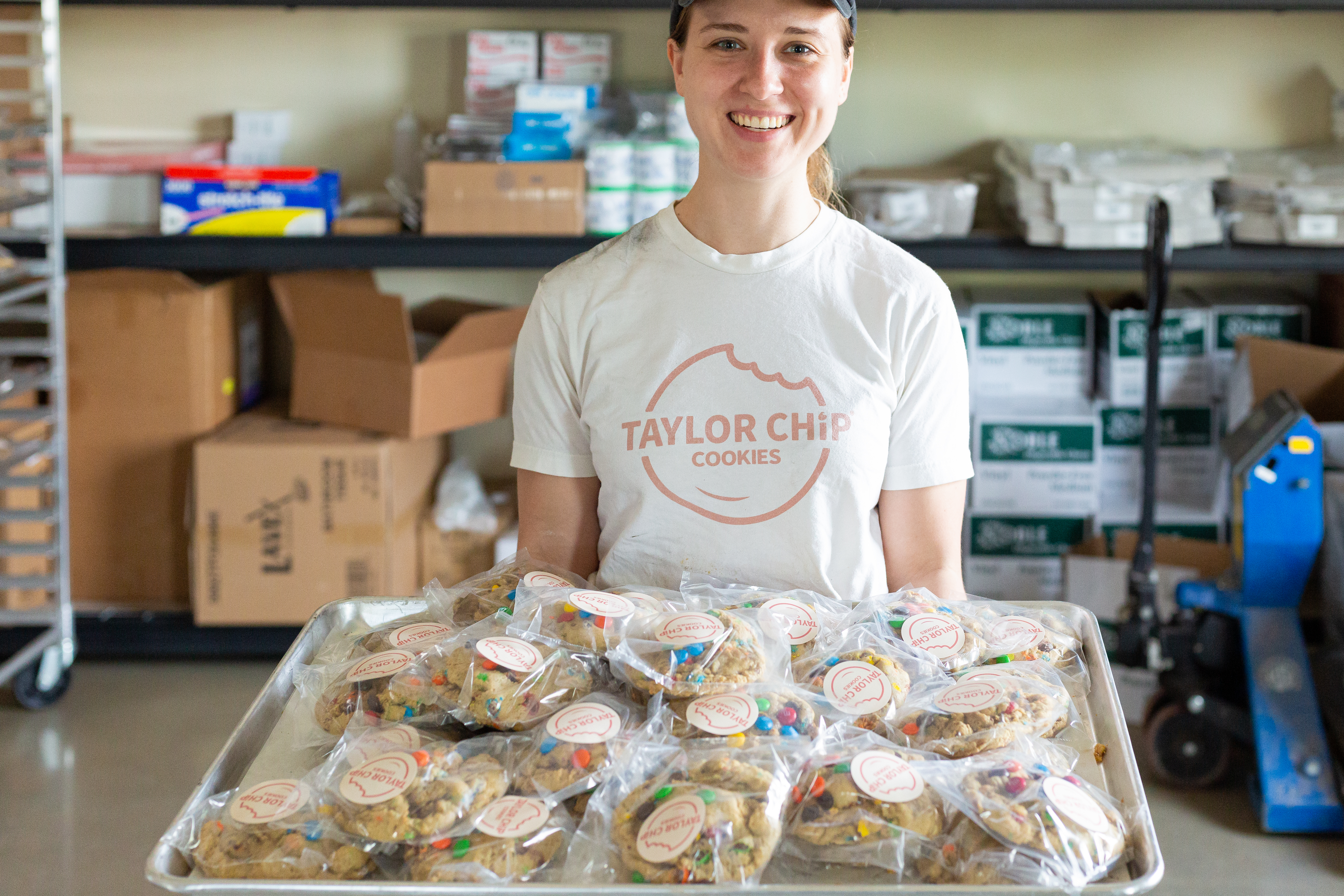Eating expired cookie dough isn't advisable because it can harbor harmful bacteria like Salmonella and E. coli, which can cause foodborne illnesses. Typical symptoms include nausea, vomiting, diarrhea, and abdominal cramps. Even if the dough appears mold-free, dangerous bacteria may still be present. Risks are higher with raw dough containing eggs or flour, especially after the expiration date. To guarantee safety, always observe expiration dates, store dough properly, and bake it at recommended temperatures. If you consume expired dough and develop severe symptoms like high fever or dehydration, seek medical attention immediately. Learn more about safe baking practices and prevention.
Key Takeaways
- Eating expired cookie dough increases the risk of foodborne illnesses due to potential bacterial contamination.
- Expired cookie dough may harbor harmful bacteria like Salmonella and E. coli, even if it appears mold-free.
- Proper storage, such as refrigeration or freezing, can extend cookie dough's shelf life and safety.
- Symptoms of foodborne illness from expired dough include nausea, vomiting, diarrhea, and abdominal cramps.
- Severe symptoms from consuming expired cookie dough require immediate medical attention, especially in vulnerable groups.
Understanding Undercooked Cookies
Undercooked cookies might seem tempting with their gooey centers, but they can pose health risks if not baked properly. Consuming undercooked cookies or raw cookie dough can lead to food poisoning due to harmful bacteria like Salmonella and E. coli. These bacteria thrive in environments where food safety protocols aren't followed, and improper storage can exacerbate the risk.
To mitigate these risks, always check the expiration dates and best-by dates on cookie dough packaging. Expired dough is more likely to harbor bacteria growth, increasing the chances of illness. Proper storage is essential in maintaining the safety of your cookie dough. Make sure to store it in airtight containers to prevent contamination and bacteria growth.
Food safety doesn't end with storage. When baking, verify your cookies reach an internal temperature that kills harmful bacteria. This helps prevent the risks associated with consuming undercooked cookies. Regularly cleaning your baking utensils and surfaces also plays an important role in food safety, reducing the potential for cross-contamination.

Choose Your Own Delightfully Perfect Cookies.
With almost 30 flavors to choose from, you can make your box as unique as you are.
Health Risks and Symptoms
Eating expired cookie dough can expose you to potential bacterial contamination, like Salmonella or E. coli. If you consume dough that's gone bad, you might experience common foodborne illness symptoms such as nausea, vomiting, diarrhea, and abdominal cramps. It's crucial to acknowledge these risks and take precautions to avoid getting sick.
Potential Bacterial Contamination
Consuming expired cookie dough poses substantial health risks due to potential bacterial contamination. The shelf life of cookie dough is designed to guarantee that you consume it while it's still safe. Once the cookie dough expiration date passes, the risk of dangerous bacteria, like Salmonella and E. coli, increases. Raw dough, especially if it contains eggs or raw flour, can harbor these harmful pathogens. Eating it after the sell-by date can lead to foodborne illness, a serious food safety risk.
Even if the dough appears to have a mold-free eyeball color, bacteria can still be present. Proper hygiene is vital, but it doesn't eliminate the risks associated with expired ingredients. Manufacturers set sell-by dates to minimize health risks, but once those dates pass, the chance of contamination rises.
Expired cookie dough can be a breeding ground for bacteria, and consuming it can lead to severe health issues. Making sure that you comply with the recommended shelf life and paying attention to the cookie dough expiration date can help you avoid these dangers. Remember, it's always better to prioritize safety and avoid the risk of foodborne illnesses.
Common Foodborne Illness Symptoms
When you consume expired cookie dough, you're at risk of developing foodborne illnesses, which come with a variety of symptoms. These symptoms often include nausea, vomiting, diarrhea, abdominal cramps, and fever. Consuming expired cookie dough, especially if it contains raw flour or eggs, can expose you to harmful bacteria like Salmonella and E. coli.
Food safety is vital to prevent these illnesses. Mold in food, for example, can produce mycotoxins, leading to severe health issues. Always check the best-before date on your cookie dough package, ensuring it's still safe to eat. Home-made cookies can also pose risks if adequate food safety procedures aren't followed during preparation.
Symptoms of foodborne illness can appear within hours of consumption or take a few days to manifest. It's important to identify these signs early and seek medical attention if they persist. Proper food safety involves not just eating within the best-before date but also storing ingredients correctly to prevent contamination.
Ensuring Cookie Safety
To guarantee your cookie dough is safe to eat, you should focus on proper baking techniques, as well as correct storage and handling practices. Always bake your dough at the recommended temperature and for the advised time to kill any harmful bacteria. Additionally, store your dough in an airtight container in the refrigerator or freezer, and handle it with clean utensils and hands to prevent contamination.
Proper Baking Techniques
Understanding proper baking techniques is essential for guaranteeing the safety of your cookies, especially if you're using expired cookie dough. First, you should be aware of cookie dough storage methods to maximize its shelf life. Keep dough in an air-tight, freezer-safe container if you plan to use it beyond its initial best-by date. Frozen dough can extend the maximum shelf life considerably, but always defrost it properly before baking. Refrigerated dough should be used within a shorter time frame.
When you're ready to bake, make certain to follow proper baking techniques. Preheat your oven to the recommended temperature to guarantee even cooking, and avoid overcrowding your baking sheet. Use fresh ingredients like eggs and butter, even if your dry ingredients come from expired dough. This helps maintain the quality and safety of the final product.
Pay close attention to food safety techniques by monitoring the dough's color, smell, and texture. If anything seems off, it's best to discard it. Remember, the key to safe, delicious cookies lies in combining proper storage, careful handling, and precise baking methods. Employ these strategies, and you can enjoy your cookies without worry.
Storage and Handling Tips
Having mastered proper baking techniques, it's equally important to focus on how you store and handle your cookie dough to confirm it's safe to eat. Proper storage and handling are essential to maintaining food safety and preventing food waste.
To make sure your cookie dough remains fresh and safe, follow these tips:
- Refrigerate promptly: Store cookie dough in the fridge if you plan to use it within a week. This slows down bacterial growth and keeps it fresh.
- Freeze for longer storage: If you're not baking soon, place the dough in the freezer. Properly wrapped, it can last for up to three months.
- Use airtight containers: Store your dough in airtight containers or tightly wrapped in plastic wrap. This prevents it from drying out and absorbing odors from other foods.
- Check food labels: Always note the expiration date on purchased dough. Even if it looks fine, expired dough can pose risks.
- Follow food safety procedures: Handle the dough with clean hands and utensils to avoid contamination. Don't leave it out at room temperature for extended periods.
When To Seek Medical Attention
If you experience severe symptoms like intense stomach pain, persistent vomiting, or high fever after eating expired cookie dough, you should seek medical attention immediately. Vulnerable groups, including pregnant women, young children, the elderly, and those with compromised immune systems, are at higher risk and should be particularly cautious. Recognizing these signs early can help in getting the necessary treatment and preventing serious health complications.
Severe Symptoms and Vulnerable Groups
Consuming expired cookie dough can lead to severe symptoms, especially for vulnerable groups like young children, the elderly, pregnant women, and those with weakened immune systems. If you or a family member falls into one of these categories, it's essential to be aware of the risks associated with eating bad cookie dough. The potential health issues can range from mild to life-threatening, and knowing when to seek medical attention is key to keeping your family safe.
Common severe symptoms include:
- Severe abdominal pain
- Persistent vomiting
- High fever
- Dehydration
- Blood in stool
These symptoms can be particularly dangerous for vulnerable groups, as their bodies may not be able to fight off infections as effectively. For these individuals, the risks of consuming expired cookie dough aren't worth the potential food costs savings. Always prioritize food safety by checking expiration dates and following guidelines for eggs for food safety.
If you notice any of these severe symptoms, don't hesitate to consult food safety resources or seek medical attention immediately. By doing so, you guarantee that you and your loved ones, especially food lovers, stay healthy and safe from the dangers of bad cookie dough.
Frequently Asked Questions
How Should Expired Cookie Dough Be Stored?
When storing expired cookie dough, you should always keep it in an airtight container in the refrigerator. Freezing is another option to prolong its life, but remember to check for any signs of spoilage before using it.
Can Expired Cookie Dough Be Used in Baking Recipes?
You shouldn't use expired cookie dough in baking recipes. The ingredients could've spoiled, affecting both taste and safety. Always check the expiration date and, if in doubt, it's best to discard it for fresher dough.
What Are the Signs That Cookie Dough Has Gone Bad?
You can tell cookie dough's gone bad if it smells sour, has visible mold, or changes color. If it's slimy or has an off texture, don't risk it. Always trust your senses and inspect it carefully.
Can You Freeze Cookie Dough to Extend Its Shelf Life?
Yes, you can freeze cookie dough to extend its shelf life. Just wrap it tightly in plastic wrap or an airtight container. This helps preserve its freshness and flavor, letting you enjoy delicious cookies later.
Does the Type of Cookie Dough Affect Its Expiration?
Yes, the type of cookie dough affects its expiration. Dough with eggs or dairy spoils faster than egg-free or vegan options. Always check the ingredients and storage instructions to guarantee you're using it safely.
Conclusion
To summarize, eating expired cookie dough poses considerable health risks, including foodborne illnesses caused by bacteria like Salmonella and E. coli. To guarantee safety, always check expiration dates, store dough properly, and cook it thoroughly. If you experience symptoms like severe abdominal pain, fever, or persistent vomiting after consuming expired dough, seek medical attention immediately. Prioritizing food safety can help you avoid potential health issues and enjoy your cookies without worry.








